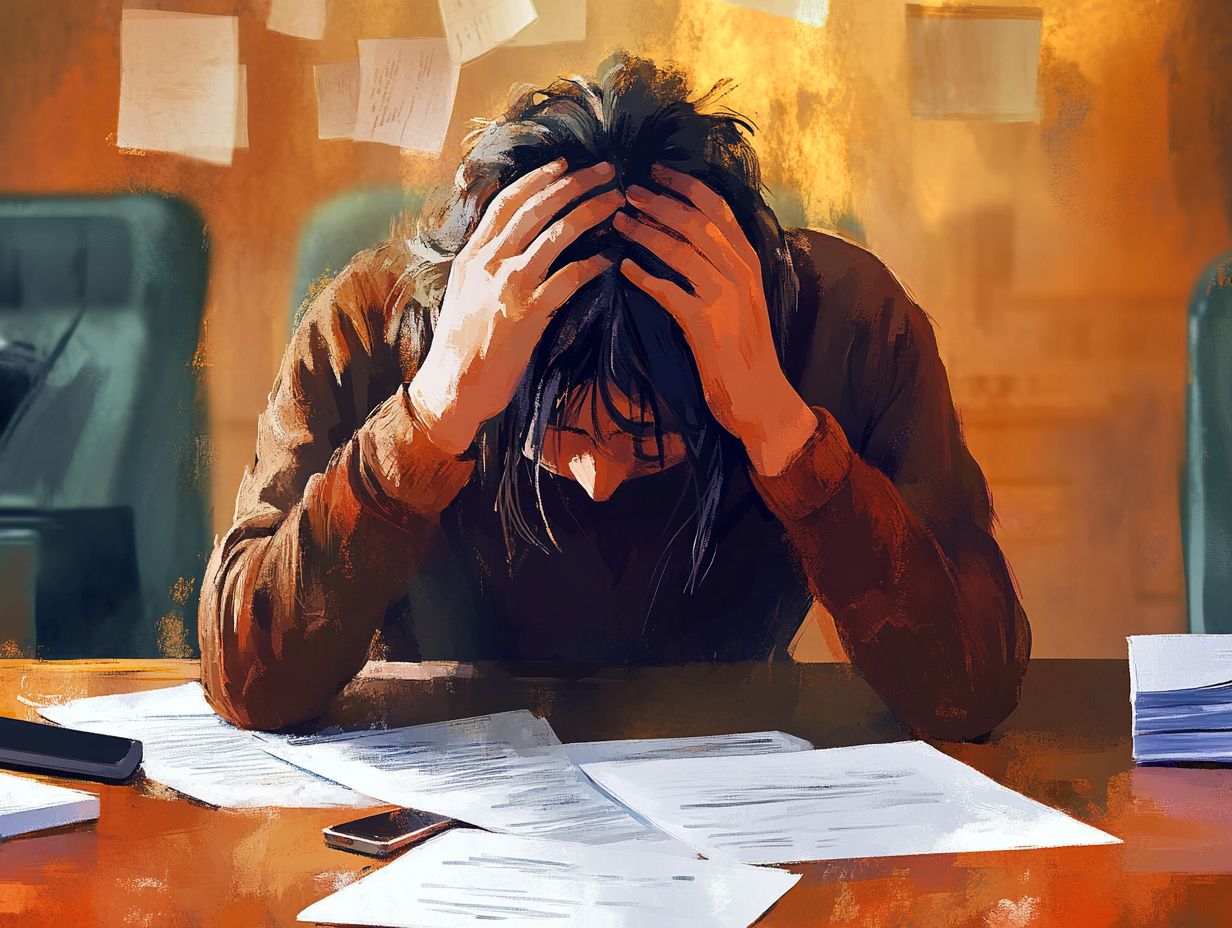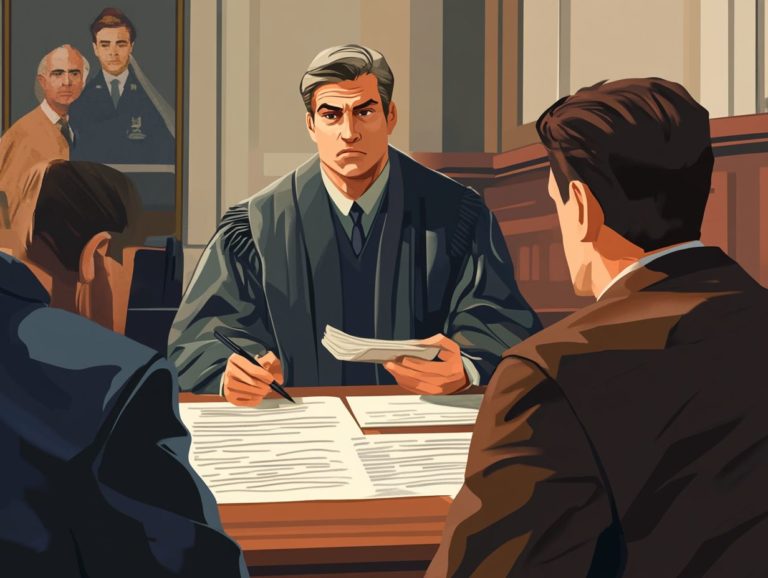What to Do if Wrongfully Accused?
Wrongful accusations can dramatically alter your life. They often leave you feeling helpless and misunderstood.
Such accusations arise from misunderstandings, bias, or outright malice. They carry significant emotional and legal consequences.
This article explores various types of wrongful accusations. It outlines practical steps to take if you find yourself facing such a situation.
It also discusses preventive measures and potential outcomes. This knowledge equips you to navigate this challenging experience with greater awareness and resilience.
Contents
Key Takeaways:

Seek legal advice and gather evidence to support your innocence. Take care of your emotional well-being by utilizing coping strategies and seeking support from loved ones.
Communicate effectively and set boundaries to prevent potential wrongful accusations. Know and protect your rights.
Understanding Wrongful Accusations
Wrongful accusations can profoundly impact your life. This is especially true in the criminal justice system, where the principle of ‘innocent until proven guilty’ is scrutinized.
These accusations may stem from false reporting or malicious prosecution. They can lead to emotional turmoil and damaging your reputation.
Understanding wrongful accusations is essential for anyone navigating these challenging situations. The repercussions extend beyond legal consequences, affecting personal relationships and mental health.
Finding legal representation from reputable firms can be a crucial step. An experienced attorney can effectively address these serious issues.
Types of Wrongful Accusations
Wrongful accusations can include defamation lawsuits, false allegations of sexual harassment, and claims related to child custody or domestic violence. Each carries unique legal and social implications.
The emotional toll from these accusations runs deep. They impact not only the accused but also their families and communities.
For instance, defamation can damage reputations and lead to humiliation. False claims of sexual harassment can have irreversible consequences on careers.
Allegations in child custody disputes can create conflict between parents. This situation affects the emotional well-being of the children involved.
Given the serious nature of these claims, the need for legal counsel is urgent. Navigating the justice system can be daunting, and experienced lawyers can provide valuable guidance.
Steps to Take if Wrongfully Accused
If you face wrongful accusations, your initial steps are crucial for your defense. Promptly gathering evidence and seeking legal counsel can significantly influence your case’s outcome.
Document every relevant detail and engage with witnesses. Consult a skilled attorney who specializes in criminal defense.
These actions will strengthen your position and protect your rights throughout the process. They can help reduce the likelihood of a wrongful conviction.
Gather Evidence and Seek Legal Advice

Gathering evidence and seeking legal advice are critical steps when facing wrongful accusations. These actions lay the groundwork for a strong defense.
Types of evidence to gather include:
- Physical evidence
- Digital records
- Witness testimony
Eyewitness accounts can provide compelling narratives that bolster your defense. Documentation like emails or texts may help establish an alibi or counter allegations.
Legal counsel plays a vital role in navigating the criminal justice system. They ensure you understand your rights and options fully.
Attorneys assist in evaluating evidence and presenting witnesses to effectively challenge the accusations against you.
Dealing with the Emotional Impact
The emotional impact of being wrongfully accused can be devastating. It often results in significant emotional damage and reputational harm that affects not just the accused but also their loved ones.
Navigating this intense stress requires using effective coping strategies and seeking support from friends, family, or professionals.
Recognizing the psychological toll of false accusations is crucial for recovery and for rebuilding your life after such trauma.
Coping Strategies and Seeking Support
Coping with the emotional fallout from wrongful accusations is vital for your mental health. Using effective coping strategies, such as therapy and support groups, can greatly improve your well-being.
Engaging in activities that build emotional resilience like mindfulness practices, journaling, or physical exercise can also be beneficial.
These approaches help ground you and restore a sense of control amidst chaos. Leaning on community support, whether through trusted friends or local organizations, fosters a sense of belonging and validation.
Mental health professionals offer coping mechanisms tailored to your unique needs. Community support networks share experiences, reminding you that you are not alone in your recovery journey.
Possible Outcomes of Wrongful Accusations
Wrongful accusations can have serious effects, leading to legal and personal consequences.
These may include wrongful convictions or defamation claims, both of which can significantly affect your life and tarnish your reputation.
Legal and Personal Consequences

Legal and personal consequences from wrongful accusations can be deeply impactful. You may face a defamation lawsuit, grapple with emotional damage, and endure long-lasting effects on your personal and professional life.
Beyond the immediate distress of the accusation, you may face intense emotional struggles, such as anxiety or depression. The repercussions can extend beyond reputational harm; you may find it hard to secure employment or maintain relationships, burdened by the stigma of being labeled a wrongdoer.
The financial implications can also be daunting. You might need to allocate significant resources for legal defense and potential civil lawsuits against those who made the accusations. These experiences reveal the chilling effect that wrongful accusations can have not just on the accused but on society as a whole.
Preventing Wrongful Accusations
Preventing wrongful accusations is essential in today s world. Social media privacy and effective communication are critical for safeguarding your reputation and relationships.
By establishing clear boundaries and being mindful of what you disclose, you can greatly reduce the risk of facing false accusations. This vigilance is key to protecting your personal and professional integrity.
Communication and Boundaries
Effective communication and establishing boundaries are vital in preventing false accusations, especially in an era where social media privacy is often compromised.
Engaging in open dialogue clarifies your intentions and expectations, fostering trust and understanding.
Using strategies like active listening and observing non-verbal cues can enhance your interactions, allowing clearer expression of thoughts and feelings.
It s equally important to define what personal information should remain private, reinforcing mutual respect in your relationships.
In a digital landscape filled with misinformation, prioritizing your social media privacy is crucial. Safeguarding your online content protects you from potential harm and acts as a proactive measure against misinterpretation and false accusations.
Staying vigilant about what you share online can significantly reduce misunderstandings and help maintain your integrity.
Protecting Yourself and Your Rights
Protecting yourself and your rights in the face of a false accusation demands vigilance. Seeking legal counsel can be your guiding light through these turbulent waters, helping to mitigate emotional damage along the way.
It s crucial to document every interaction and incident related to the accusation; this evidence can be pivotal in defending against unfounded claims. Building a supportive network of friends and family during these challenging times offers essential emotional comfort, as the psychological toll of such accusations is often underestimated.
Understanding the legal landscape your rights and the processes involved is vital. Enlisting the help of counsel experienced in this arena ensures that your defenses are both robust and effectively tailored.
An attorney can also assist in strategizing the best ways to engage with law enforcement, safeguarding both your emotional well-being and legal interests as the situation unfolds.
Frequently Asked Questions

What to Do if Wrongfully Accused of a Crime?
If you have been wrongfully accused of a crime, it is important to remain calm and gather as much evidence as possible to prove your innocence. Knowing what to do if you are falsely accused of a crime is crucial. Contact a lawyer immediately and do not speak to anyone about the case without their guidance.
What to Do if Wrongfully Accused of Cheating?
If you are being accused of cheating, remain composed and gather any evidence that can prove your innocence. Speak to the accuser and try to understand their perspective. If the accusations persist, seek legal advice.
What to Do if Wrongfully Accused of Stealing?
If you have been falsely accused of stealing, do not panic and try to remain calm. Gather evidence and witnesses that can support your innocence. Contact a lawyer for guidance and avoid speaking to the accuser without their presence.
What to Do if Wrongfully Accused of Harassment?
If you are facing wrongful allegations of harassment, do not engage in any further contact with the accuser. Contact a lawyer and gather any evidence that can prove your innocence. Do not speak to anyone about the case without legal guidance.
What to Do if Wrongfully Accused of Plagiarism?
If you have been accused of plagiarism, it is important to gather any evidence that can prove your work is original. Contact your professor or academic advisor for assistance and seek legal advice if necessary.
What to Do if Wrongfully Accused of Fraud?
If you are facing accusations of fraud, do not make any statements without legal representation. Gather evidence to prove your innocence and contact a lawyer immediately. Avoid speaking to anyone about the case without their guidance.






